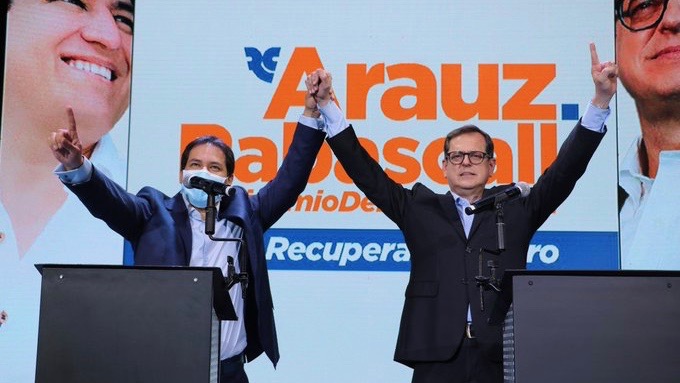The Union for Hope (UNES), an alliance of progressive forces, on September 16, elected journalist Carlos Rabascall as the new candidate for the vice-presidency of Ecuador in the general elections scheduled for February 7, 2021. The decision was taken after Rafael Correa was disqualified from running as vice-presidential candidate.
Last week, on September 7, Ecuador’s national court of justice ratified the 8-year prison sentence and the 25-year political ban for Correa in the “Bribes 2012-16” corruption case, barring him from contesting in the 2021 general elections. The ruling was denounced by several political analysts and leaders from across the globe as a part of the lawfare, with which the ruling party and its right-wing allies intend to remove him from the electoral race. As such the UNES was forced to find a different person to run on the ticket.
Former president Correa supported Rabascall’s nomination in his place and described him as a person “of great humanism, progressive and linked to the business sectors,” in an interview with RT.
In the presentation event, the UNES presidential candidate and economist, Andrés Arauz, also praised his running mate and said that “he meets a profile to achieve productive development with territorial equity.”
“The Union for Hope is the force that will defend and also monitor our political project. Carlos, together with all the Ecuadorian people, we will win,” wrote Arauz later in a tweet.
#ElBinomioDeLaEsperanza | "La prioridad de nuestro gobierno será pagar los salarios atrasados, atender a quienes el Gobierno olvidó, cuidar a todas y todos, garantizar que su vida y la de sus familias tengan dignidad" Andrés Arauz @ecuarauz. pic.twitter.com/I5CNJLMLqk
— Movimiento Revolución Ciudadana (@EcuadorRC) September 16, 2020
For his part, Rabascall thanked for the entrusting faith in him and vowed “to recover the homeland for citizens.” He emphasized on the need to focus on production issues, reactivation of rurality and support for small businesses.
“I reiterate my commitment to take on this historic challenge with humbleness, but with the firm commitment to build with you, Andrés Arauz, and the Ecuadorian people, the country we long for and deserve,” tweeted Rabascall.
#ElBinomioDeLaEsperanza | "Estamos caminando con fuerza, agradezco hoy a quienes entendieron que la unidad del progresismo si era posible y es una realidad. Este es ejemplo y testimonio que nos unen causas comunes" Carlos Rabascal @rabascallcarlos pic.twitter.com/ZOukvdBYNU
— Movimiento Revolución Ciudadana (@EcuadorRC) September 16, 2020
The National Electoral Council (CNE) of Ecuador is expected to accept Rabascall’s candidacy and formalize his registration by the end of this week.
59-year-old Rabascall is a commercial engineer, an economist and a journalist. Although Rabascall was not a part of Correa’s “Citizen Revolution” or his government (2007-2017), he was one of the prominent faces of the state-owned news channel Ecuador TV. As a public official, he held the position of Director of the Institutional Development of the National Secretariat for Administrative Development (SENDA). He was also a member of the National Modernization Council (CONAM).
On the same day and two days before the deadline to register candidates for the upcoming elections, the CNE, once again, annulled the registration of the Fuerza Compromiso Social (FCS) or Social Commitment Force, Correa’s party and a part of the UNES coalition. In a plenary session, the CNE resolved to disqualify the FCS, Libertad es Pueblo, Justicia Social and Juntos Podemos parties because these four political movements failed to meet the requirement of gathering 1.5% of the electoral roll to run for elections.
The disqualification was widely condemned by various activists, intellectuals and political leaders on social networks. They denounced the decision as another attempt of political persecution against Correistas, intended to prevent them from running in the elections.
Correa also rejected the decision and said that “fraud is evident” and that his opponents are “desperate for their sure defeat at the polls.” “They are desperate because they know that we are going to sweep the polls and they won’t know where to hide because of what they are doing,” he stressed.
Cuando recuperemos la Patria, “abogado” Zurita -responsable del “informe”- tendrá que responder ante la justicia
NO EXISTEN las “19.237 firmas con inconsistencias”. Es una PROYECCIÓN de Contraloría, basada en un MUESTREO del… ¡1%!@gerardodeicaza @CIDH @ONUHumanRights pic.twitter.com/YXdIZd46DN— Rafael Correa (@MashiRafael) September 16, 2020
Presidential candidate Arauz requested the United Nations and the European Union to appoint an observer commission to evaluate the work of the CNE.
The leaders and pre-candidates of the four movements eliminated by the CNE anticipated that they would appeal the resolution as it is contrary to the decision of the Electoral Dispute Court (TCE) in August, in which their legal status was ratified.





